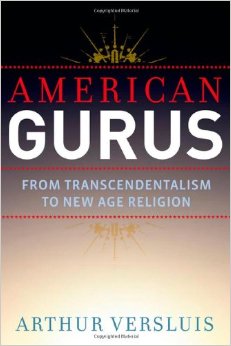In our interview series, “Seven Questions,” we ask cultural theorists about what inspires them and how their latest work challenges our understanding of the sacred in cultural life. For this segment, we chatted with Arthur Versluis, author of American Gurus: From Transcendentalism to New Age Religion.

1. What sparked the idea for writing this book? Why write it now?
American Gurus was a long time in the making. I first had the ideas for some of the book when I was working on American Transcendentalism and Asian Religions (1993). In particular, I wanted to look at how Platonism influenced American Transcendentalism. More than two decades later, I returned to this subject to write the third in the trilogy of books that also included The Esoteric Origins of the American Renaissance (2001). What I didn’t know was just how far my reading and research would take me, and what journey was necessary before I could complete this third in the trilogy, American Gurus. When I wrote it, I was surrounded by piles of rare books and other kinds of media, ranging from a previously undiscussed manuscript of Bronson Alcott held at Harvard that alluded to aspects of his mystical experiences, to the CDs and DVDs of contemporary guru figures in California and elsewhere. American Gurus was a great deal of pleasure to write it, let me tell you: it was a true scholarly journey.
2. How would you define “religion” in relation to your work? Where do you see the sacred or sacred things in this book?
American Gurus focuses on religious experience, in particular, on accounts of enlightenment experiences and on guru-student relationships. It traces the history, in American religion, of what I call “immediatism,” meaning the assertion of immediate spiritual illumination without much if any preparatory practice within a particular religious tradition. Some call this “instant enlightenment.” It is, of course, controversial, and I include both proponents and critics.
3. Can you summarize the three key points you’d like the reader to walk away with when finished?
Actually, I’d prefer to offer a single key point: that American religious history includes a current that I term “immediatism,” whose origins precede American Transcendentalism, and whose exemplars include a whole array of historical figures, right up to contemporary New Age exponents. In this line, a figure like Timothy Leary, and other erstwhile psychedelic evangelists, play a significant role because what could be more immediate than the result of taking a pill? The epigraph of the book by George Gallup expresses much of what I am suggesting here, that “Americans want the fruit of religion, but not its obligations.”
4. Who are your inspirations or intellectual models for you as you wrote this book?
This is a subject without much precedent. But I do appreciate the work of Catherine Albanese and of Phillip Lucas in particular. There are some books that focus on Hinduism in America, for instance, but only a few of us have looked closely at this phenomenon of contemporary immediatist guru-figures, which includes the “satsang movement,” as well as other figures who don’t necessarily belong to that movement but whose work or approach is similar to it. How did we get here? What in American history lends itself to Neo-Advaita and related movements in the New Age? This is the question to which American Gurus provides the answer.
5. What was the most difficult thing about writing the book? Did you encounter any unexpected problems or challenges?
Developing the terminology used in the book was the most challenging part. What terms are best to describe the religious claims made by various historical and contemporary figures in the book? The book itself was a great pleasure to write, but I went through multiple drafts and quite a bit of shaping in order to produce the actual final text.
6. What’s the most unexpected response, critical or positive, that you’ve gotten about the book?
As it happens, followers of particular gurus or guru-figures sometimes express their disappointment that I include some reference to this or that scandal; however, if it’s part of the historical record and germane, I may feel it necessary to do so. But my approach is consciously even-handed.
7. With this book done, what’s up next for you?
I am working on a book on mysticism, with a particular focus on the important role of Platonism in Western mysticism. I’m also writing on the apparently hopelessly gerrymandered category of “Western esotericism.” Mysticism as a subject may be currently out of favor in some of the academy, but that makes it all the more interesting, doesn’t it?
Arthur Versluis, Chair of the Department of Religious Studies and Professor in the College of Arts & Letters at Michigan State University, holds a doctorate from the University of Michigan, Ann Arbor, and has published numerous books and articles. Among his books are Magic and Mysticism: An Introduction to Western Esotericism (Rowman Littlefield, 2007), The New Inquisitions: Heretic-hunting and the Intellectual Origins of Modern Totalitarianism (Oxford UP, 2006), Restoring Paradise: Esoteric Transmission through Literature and Art (SUNY: 2004); The Esoteric Origins of the American Renaissance (Oxford UP: 2001); Wisdom’s Book: The Sophia Anthology, (Paragon House, 2000); Island Farm (MSU Press, 2000); Wisdom’s Children: A Christian Esoteric Tradition (SUNY: 1999); and American Transcendentalism and Asian Religions (Oxford UP, 1993). Versluis was awarded a Fulbright scholarship to Germany, and is the founding editor of Esoterica, and co-editor of JSR: Journal for the Study of Radicalism. He is the founding president of the Association for the Study of Esotericism.
